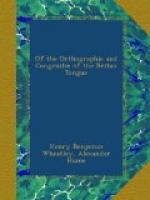Ida, Scotland or Edinburgh, p. 2.
Incurre, v. = to run into. Lat. incurro,
pp. 20, 33.
Ken = know, p. 21.
Kep, v. = to intercept, p. 14.
Kepping = receiving in the act of falling, p. 12.
Jamieson.
Knau = know, p. 2.
Knaulege = knowledge, pp. 3, 10;
knawlege, pp. 11, 21.
Knaw = know, pp. 7, 30;
knawe, p. 21;
knawen = known, p. 29.
Laggared = loitered or rested, p. 2.
Lang = long, pp. 9, 14.
Leave = live, p. 32.
Leve = live, pp. 32, 34.
Leving = living, p. 11.
Louse = loose, p. 9.
Lykwayes = likewise, p. 19.
Maer = more, pp. 2, 10.
Maest = most, pp. 1, 2, 16.
Man = must, p. 8.
Mare = more, p. 30.
Mast = most, pp. 30, 32.
Meer = mare, p. 28.
Middes = middle, p. 16.
Mikle = much, pp. 13, 18, 19, 20.
Mint = aim, pressure, p. 18.
Minted = attempted, p. 15.
Moat, probably moot, discussion, chat, etc.,
p. 2. A.S. m{o’}t.
Moe = more, pp. 16, 19, 21, 27.
Moien = means for attaining an end, p. 2. Jamieson.
Fr. moyen.
Mont = mount, p. 24.
Montan = mountain, pp. 3, 11, 28.
Mynt = aim, pp. 12, 17.
Nae = no, pp. 1, 8.
Nane = none, p. 13.
Noat, v. = note, pp. 19, 22, 27, 28, 29, 30,
31, 33.
Noat = note, pp. 7, 13, 28, 29;
noate, p. 28;
noates = notes, p. 29.
Nor = than, p. 3.
Nor, God nor, p. 31.
This most probably means God
comfort or nourish us, connected with
norice, a nurse, and
norie, a foster-child. There is also a
substantive nore in
Chaucer, meaning comfort. Norne is to
entreat, ask (see Alliterative
Poems Glossary), and may have
something to do with this
expression, but it is hardly so probable
as the above.
Noute = black cattle, p. 27;
connected with neat,
as in neat-cattle, neat-herd.
Nulleth = negatives, p. 33.
Nurice = nurse, p. 19.
Of = off, p. 23.
Ones, at ones = at once, p. 18.
Paen = trouble, p. 2.
Paert = part, p. 10.
Peple = people, pp. 20, 29.
Phason = pheasant (?), p. 13.
Pover = poor, p. 3.
Punct = stop, p. 34.
Qu.
At p. 18 the author gives
his reasons for making use of the guttural
qu in the place of
the labial w. The following are the words
in
which it is thus used:—
Quha = who, pp. 2, 3, 34.
Quhae = who, pp. 1, 10;
quhae’s = whose, p. 2.
Quhaer = where, p. 2.
Quhar = where, p. 29.
Quharein = wherein, p. 14.
Quharof = whereof, p. 16.
Quhat = what, pp. 2, 8, 15, 17, 18, 28.
Quhatever = whatever, p. 19.
Quhen = when, pp. 2, 9, 11, 23, 31.
Quhence = whence, pp. 29, 32.
Quher = where, pp. 2, 14, 20, 32.
Quheras = whereas, p. 14.
Quherat = whereat, p. 18.




